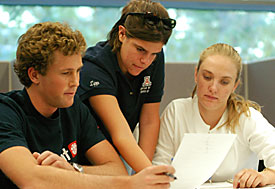 |
|
DAVID HARDEN/Arizona Daily Wildcat
|
Business management senior Samantha Zipp (center) and marketing seniors John Drachman and Marissa Weckerly study plans for their future business, "SLC Consulting." The Berger Entrpreneurship program helps students develop ideas to start their own businesses.
|
|
By Brittany Manson
Arizona Daily Wildcat
Tuesday December 3, 2002
Though the election season stump speeches of many politicians focused on making the UA a stronger engine in Arizona's economy and founding new businesses, students are graduating with the skills to start their own business right out of college.
An entrepreneurship program run out of the Eller College of Business and Public Administration for nearly two decades has graduated students who have started 100 companies, said Joann Rockwell, program director for the Berger Entrepreneurship program.
After graduating in May, Samantha Zipp, a senior with majors in psychology, business and the entrepreneurship program, together with two of her classmates, plans to turn classroom blueprints into reality by starting a company that will help incoming freshmen make the transition to college life.
As part of the program, students will write a complete business plan with help from their professors, who are local entrepreneurs.
More than 150 students per year apply to the Berger Entrepreneurship program. This year, 95 were accepted, said Sherry Hoskinson, associate director for the Karl Eller Center, which runs the entrepreneurship program.
The program is a joint-major, meaning a student must declare another major in addition to the program.
"They don't hold your hand," Zipp said. "It's all up to you, if you put in 150 percent, you will get out 150 percent."
Another entrepreneurship student turned his course project into a plan to expand his local coffee shop to two other locations across town.
After receiving an engineering degree from the UA in 1993, Eric Barnes went back to get his master's of business administration in entrepreneurship.
When he started the graduate program, he and his wife owned the Chocolate Iguana coffee shop on North Fourth Avenue.
He completed his degree in 1993 and said he used what he learned to expand the Chocolate Iguana from one location to three.
The classes helped Barnes "refocus the company on pursuing a market niche that was beneficial," he said. "Before that, we were fighting for our lives."
Barnes sold the business in 2000 and went to work as a comptroller for a company that makes aerospace parts.
The Berger program was started in 1985 and was recently named in the top five percent of all entrepreneurship programs nationally.
The program teaches three groups: undergraduate business students, MBA students and associate business students who attend technical schools.
This year, 45 undergraduate, 40 MBA and 10 associate students were accepted into the program, said Hoskinson.
Undergraduate- and graduate-level students are taught separately and are joined only for receptions and presentations by professionals in the community.
In order to be admitted to the program, students must have advanced standing at the business school, write an essay displaying their entrepreneurial spirit that outlines what the student can bring to the program, submit letters of recommendation and schedule an interview with the selection committee.
"The process is tough, but the people really are top-caliber in this program," said Steve Reichling, who finished the program in 2000. "It's only selective to get the really motivated people in the program."
Once accepted, students are divided into groups of two or three to develop a plan for a business, submit a proposal and do studies on whether their business plan is feasible.
Before the business idea can be developed, the faculty must approve it, Reichling said.
"They rip you apart and shoot you down quickly, but it is a good skill to have presented a business plan at this stage," Reichling said.
Students also debate with each other about their plans and try to poke holes in each other's ideas.
If the business plan survives the first trials, the group develops legal and financial components over the next year.
Reichling has tried a few business ventures since graduating.
Immediately following his graduation, he started a business to bring international students to the United States for schooling.
After the last year's Sept. 11 attacks, the business went under.
Reichling is now working on a $100 million project to build a new branch of the UA medical school in Phoenix.

